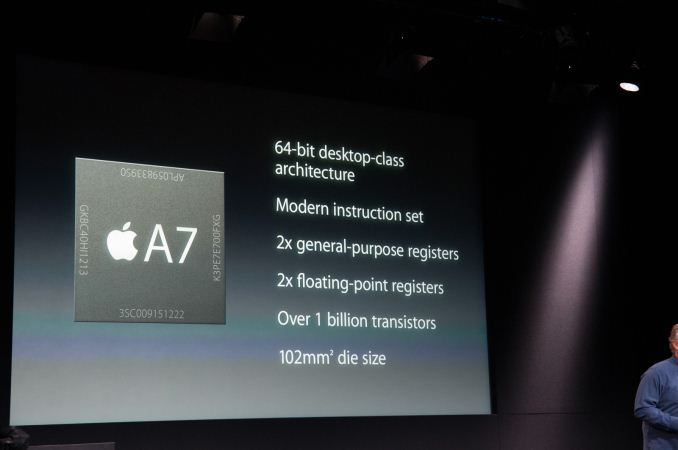Apple’s claims that the 64-bit A7 processor is “desktop-grade” are more than marketing propaganda, a new report from AnandTech reveals, as the processor is far more powerful than anything competitors in the mobile space have come up with thus far. The publication has come across more documentation on the A7 chip, which, paired with its own investigations, helped it conclude that there are “almost” no iOS apps to actually take advantage of the CPU’s power.
“Looking at Cyclone [codename of A7] makes one thing very clear: the rest of the players in the ultra mobile CPU space didn’t aim high enough,” AnandTech wrote. “I wonder what happens next round.”
The publication went into great detail describing the A7 processor, revealing that “Cyclone is big,” or “bigger than anything else that goes in a phone.” “Apple didn’t build a [Qualcomm Snapdragon ]Krait / [Intel] Silvermont competitor, it built something much closer to Intel’s big cores,” AnandTech added.
“Cyclone is a bold move by Apple, but not one that is without its challenges. I still find that there are almost no applications on iOS that really take advantage of the CPU power underneath the hood. More than anything Apple needs first party software that really demonstrates what’s possible,” the publication said. “The challenge is that at full tilt a pair of Cyclone cores can consume quite a bit of power. So for now, Cyclone’s performance is really used to exploit race to sleep and get the device into a low power state as quickly as possible. The other problem I see is that although Cyclone is incredibly forward-looking, it launched in devices with only 1GB of RAM. It’s very likely that you’ll run into memory limits before you hit CPU performance limits if you plan on keeping your device for a long time.”
AnandTech expects the A8 processor that will equip the upcoming iPhone 6 and new iPad Air models to be clocked even faster than its predecessor, as Apple moves to 20nm process, saying it suspects Apple to have “more tricks up its sleeve than that.”
Apple A7 processor has been criticized by competitors for being a “marketing gimmick,” although those statements were quickly retracted. Later reports revealed that the processor was a blow chipmakers did not see coming.
In the past, various reports claimed that Apple will replace Intel chips with ARM CPUs in future MacBook Air models, although the company has failed to announce ARM-based OS X machines so far.




